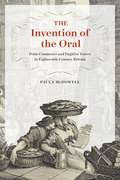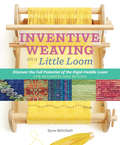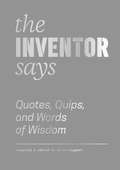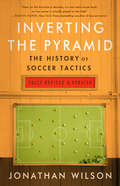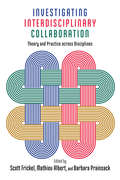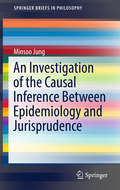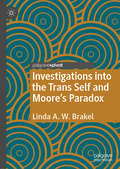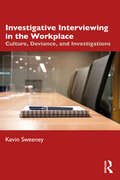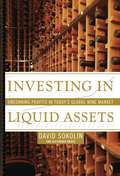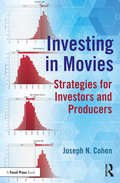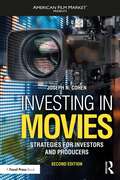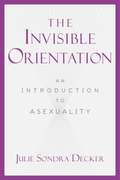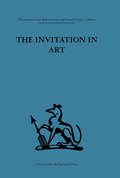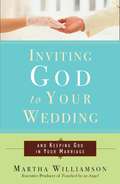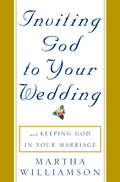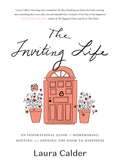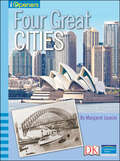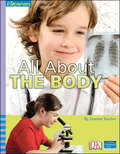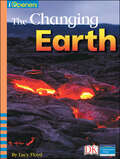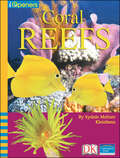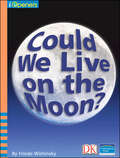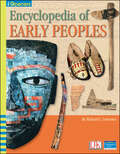- Table View
- List View
The Invention of the Oral: Print Commerce and Fugitive Voices in Eighteenth-Century Britain
by Paula McDowellJust as today’s embrace of the digital has sparked interest in the history of print culture, so in eighteenth-century Britain the dramatic proliferation of print gave rise to urgent efforts to historicize different media forms and to understand their unique powers. And so it was, Paula McDowell argues, that our modern concepts of oral culture and print culture began to crystallize, and authors and intellectuals drew on older theological notion of oral tradition to forge the modern secular notion of oral tradition that we know today. Drawing on an impressive array of sources including travel narratives, elocution manuals, theological writings, ballad collections, and legal records, McDowell re-creates a world in which everyone from fishwives to philosophers, clergymen to street hucksters, competed for space and audiences in taverns, marketplaces, and the street. She argues that the earliest positive efforts to theorize "oral tradition," and to depict popular oral culture as a culture (rather than a lack of culture), were prompted less by any protodemocratic impulse than by a profound discomfort with new cultures of reading, writing, and even speaking shaped by print. Challenging traditional models of oral versus literate societies and key assumptions about culture’s ties to the spoken and the written word, this landmark study reorients critical conversations across eighteenth-century studies, media and communications studies, the history of the book, and beyond.
Inventive Weaving on a Little Loom: Discover the Full Potential of the Rigid-Heddle Loom, for Beginners and Beyond
by Syne MitchellRigid-heddle weaving is simple to learn, is easy to master, and offers a lifetime of possibilities to discover! Inventive Weaving on a Little Loom covers everything rigid-heddle weavers need to know about the craft, from the basics — how to select a loom, set it up, and get started — to a wide variety of fun techniques that yield beautiful results. Begin by exploring a variety of weave structures, including finger-manipulated laces, tapestry, and color play with stripes, plaids, and multicolor yarns. Then move on to more complex designs and irresistible projects, from pillows and curtains to bags, shawls, and even jewelry. Explore warp-face patterning, weft-pile weaving, weaving with fine threads, woven shibori, shadow weave, and the textural effects you can create with different yarns and with wire and conductive thread. Everything you need to know is here, with fully illustrated step-by-step instructions to ensure success.
The Inventor Says: Quotes, Quips and Words of Wisdom
by Kevin LippertThe sixth in our popular Words of Wisdom series, The Inventor Says invites readers to a gathering of history's most brilliant creative minds, where inventors past and present jostle, compete, contradict, and compliment each other. Groundbreakers such as Leonardo da Vinci, Benjamin Franklin, Henry Ford, Ada Lovelace, the Wright Brothers, and Sejong the Great converse with the twentieth century's most ingenious tinkerers and thinkers, from Buckminster Fuller, Ruth Handler (creator of the Barbie doll), Nikola Tesla (who cuts Thomas Edison down to size for his lack of scientific discipline), and Apple's Steve Wozniak to contemporary figures like Lisa Seacat DeLuca, IBM's most prolific female inventor. These intrepid innovators discuss their childhood, inspirations, working habits, failure as a productive stage in the creative process, and much more, in a collection that will inspire readers to hatch a few brilliant ideas of their own. As Edwin Land advised: "Don't undertake a project unless it is manifestly important and nearly impossible."
Inverting The Pyramid: The History of Soccer Tactics
by Jonathan Wilson<P>Inverting the Pyramid is a pioneering soccer book that chronicles the evolution of soccer tactics and the lives of the itinerant coaching geniuses who have spread their distinctive styles across the globe. <P>Through Jonathan Wilson's brilliant historical detective work we learn how the South Americans shrugged off the British colonial order to add their own finesse to the game; how the Europeans harnessed individual technique and built it into a team structure; how the game once featured five forwards up front, while now a lone striker is not uncommon.Inverting the Pyramid provides a definitive understanding of the tactical genius of modern-day Barcelona, for the first time showing how their style of play developed from Dutch "Total Football," which itself was an evolution of the Scottish passing game invented by Queens Park in the 1870s and taken on by Tottenham Hotspur in the 1930s. <P>Inverting the Pyramid has been called the "Big Daddy" (Zonal Marking) of soccer tactics books; it is essential for any coach, fan, player, or fantasy manager of the beautiful game
Inverting The Pyramid: The History of Soccer Tactics
by Jonathan Wilson"An outstanding work ... the [soccer] book of the decade.” -Sunday Business PostInverting the Pyramid is a pioneering soccer book that chronicles the evolution of soccer tactics and the lives of the itinerant coaching geniuses who have spread their distinctive styles across the globe. Through Jonathan Wilson's brilliant historical detective work we learn how the South Americans shrugged off the British colonial order to add their own finesse to the game; how the Europeans harnessed individual technique and built it into a team structure; how the game once featured five forwards up front, while now a lone striker is not uncommon.Inverting the Pyramid provides a definitive understanding of the tactical genius of modern-day Barcelona, for the first time showing how their style of play developed from Dutch "Total Football,” which itself was an evolution of the Scottish passing game invented by Queens Park in the 1870s and taken on by Tottenham Hotspur in the 1930s. Inverting the Pyramid has been called the "Big Daddy” (Zonal Marking) of soccer tactics books; it is essential for any coach, fan, player, or fantasy manager of the beautiful game
Inverting The Pyramid: The History of Soccer Tactics
by Jonathan WilsonFully revised and updated, this fifteenth-anniversary editionn soccer book chronicles the evolution of the sport and how it has affected the lives of players, coaches, and fans–perfect for those who adore the timeless game. In Inverting the Pyramid, Jonathan Wilson offers a masterly global history of the world's game, from unruly beginnings to contemporary strategy. He analyses the 2022 World Cup, charting the influence of the great Spanish, German and Portuguese tacticians of the last decade, whilst pondering the effects of football's increased globalization and commercialization. Inverting the Pyramid has been called the "Big Daddy" (Zonal Marking) of soccer tactics books; it is essential for all soccer aficionados.
Investigating Interdisciplinary Collaboration: Theory and Practice across Disciplines
by Aaron Panofsky Ali O. Ilhan Angela Cassidy Ayelet Kuper Barbara Prainsack Chisato Fukuda Cyrus C.M. Mody Daniel Lee Kleinman Dave Mcbee Elise Paradis Erin Leahey Gregory J. Downey Hauke Reisch Helga Nowotny Itai Vardi Jennifer Croissant Laurel Smith-Doerr Mathieu Albert Noah Weeth Feinstein Ryan Light Scott Frickel Sigrid Peterson Timothy Sacco Jimi AdamsInterdisciplinarity has become a buzzword in academia, as research universities funnel their financial resources toward collaborations between faculty in different disciplines. In theory, interdisciplinary collaboration breaks down artificial divisions between different departments, allowing more innovative and sophisticated research to flourish. But does it actually work this way in practice? Investigating Interdisciplinary Collaboration puts the common beliefs about such research to the test, using empirical data gathered by scholars from the United States, Canada, and Great Britain. The book’s contributors critically interrogate the assumptions underlying the fervor for interdisciplinarity. Their attentive scholarship reveals how, for all its potential benefits, interdisciplinary collaboration is neither immune to academia’s status hierarchies, nor a simple antidote to the alleged shortcomings of disciplinary study.
An Investigation of the Causal Inference between Epidemiology and Jurisprudence (SpringerBriefs in Philosophy)
by Minsoo JungThis book examines how legal causation inference and epidemiological causal inference can be harmonized within the realm of jurisprudence, exploring why legal causation and epidemiological causation differ from each other and defining related problems. The book also discusses how legal justice can be realized and how victims' rights can be protected. It looks at epidemiological evidence pertaining to causal relationships in cases such as smoking and the development of lung cancer, and enables readers to correctly interpret and rationally use the results of epidemiological studies in lawsuits. The book argues that in today's risk society, it is no longer possible to thwart the competence of evidence using epidemiological research results. In particular, it points out that the number of cases that struggle to prove a causal relationship excluding those using epidemiological data will lead to an increase in the number of lawsuits for damages that arise as a result of harmful materials that affect our health. The book argues that the responsibility to compensate for damages that have actually occurred must be imputed to a particular party and that this can be achieved by understanding causal inferences between jurisprudence and epidemiology. This book serves as a foundation for students, academics and researchers who have an interest in epidemiology and the law, and those who are keen to discover how jurisprudence can bring these two areas together.
Investigations into the Trans Self and Moore's Paradox
by Linda A. BrakelThis book explores how the trans phenomenon can challenge the existing concept of the Self and its nature. The catalyst is Moore’s Paradox: can a trans person coherently state ‘I am a girl but I don’t believe that’? More deeply, three fundamental philosophical questions arise, of ontological, epistemological, and conceptual significance: what Self understands that the natal-gender is ‘wrong’? How does the trans person know that the natal-gender is ‘wrong’ and what counts as evidence? And finally, how does this effect the concept of Self itself? Seeking answers, Brakel considers various theories of the Self, including classical accounts, modern views, and models developed by selected gender theorists. The book then takes a biological turn, first developing an evolutionary proper-function analysis of gender and trans-gender and subsequently proposing the possibility of a new ontological phenotype. With a review of cutting-edge neuroscientific research conducted over the last twenty-five years, Brakel propels this timely and important investigation toward the future, using experimental philosophy empirical studies adapted from classic thought experiments on the nature of the Self.
Investigative Interviewing in the Workplace: Culture, Deviance, and Investigations
by Kevin SweeneyBased on extensive interdisciplinary research and the author’s over 30 years of experience in the field, this book provides best practice skills for auditors and investigators in any type of investigation and adapts them to ensure they are relevant to a corporate environment where the powers available to police are absent. In addition to providing technical skills and practical advice on investigative interviewing, former police investigator Kevin Sweeney explains how to analyze information to assist in the investigation and to identify emerging trends to provide opportunities to prevent problems before they occur. Readers will come to understand legal concepts such as the chain of evidence, the psychological factors involved in questioning, and the sociological factors that can help to build a macro understanding of the organization and the event in question. This book will become an essential resource for professionals involved in auditing or investigation work of any type in the corporate or public sectors, in contexts including human resources, employee relation investigations, auditing, or where criminal activity is suspected.
Investing in Liquid Assets: Uncorking Profits in Today's Global Wine Market
by David Sokolin Alexandra BruceNow more than ever, the value of Investment-Grade Wines (IGWs) and opportunities to invest in wine as an asset class are soaring. With a little research and a little risk, wine enthusiasts on every level will find it possible to gain big rewards in wine investment -- and there's never been a better time to try. IGWs have dependably outperformed blue chip stocks over the past 150 years, and the upscale wine market is still an area in which independent investors can profit handsomely. A third-generation wine merchant, and CEO of one of the largest rare-wine companies in the world, David Sokolin knows how to turn fine wine into cold cash. And he knows how you can, too. In simple, practical terms, Investing in Liquid Assets provides all the information you need to understand the economic principles that govern the world of fine wine and take advantage of the resources currently available. Using his insider's expertise, Sokolin defines Investment-Grade Wine and identifies the most financially important wine regions and styles. Defining the key players in the field, Sokolin shows you how to navigate the world of wine critics and understand the impact of their scores, and he explains why it's perfectly fine that your own personal tastes really don't matter. He offers tips on where to find reputable sources for fine wine, how to manage storage and resale, as well as all-important buying and selling strategies. In the second half of the book, he gives overviews of the world's greatest wine regions and offers his predictions about which regions and which wines are likely to represent the greatest investment opportunities in the near future. Providing information and tactics previously known only to successful professionals, Investing in Liquid Assets turns your passion for fine wine into a valuable resource that will pay for itself.
Investing in Movies: Strategies for Investors and Producers
by Joseph N. CohenInvesting in Movies: Strategies for Investors and Producers is a useful guide for investors and producers looking for an analytical framework to assess the opportunities and pitfalls of film investments. The book traces macroeconomic trends and the globalization of the business, as well as the impact these have on potential returns. It offers a broad range of guidelines on how to source interesting projects and advice on what kinds of projects to avoid, as well as numerous ways to maximize risk-adjusted returns. While focusing primarily on investments in independent films, industry veteran and author Joseph Cohen also provides valuable insights into the studio and independent slate deals that have been marketed to the institutional investment community. Features of this book include: A guide to the minefield of film investing for the potential investor, giving students and aspiring professionals an insider perspective; A detailed explanation of the risk and rewards inherent in the film business and how to evaluate projects; Thorough coverage of the cast of characters that populate the film space, and advice on building relationships to optimize opportunities.
Investing in Movies: Strategies for Investors and Producers (American Film Market Presents)
by Joseph N. CohenIn this second edition of Investing in Movies, industry veteran Joseph N. Cohen provides investors and producers with an analytical framework to assess the opportunities and pitfalls of film investments. The book traces macroeconomic trends and the globalization of the business, including the rise of streamers, as well as the impact these have on potential returns. It offers a broad range of guidelines on how to source interesting projects and advice on what kinds of projects to avoid, as well as numerous ways to maximize risk-adjusted returns. While focusing primarily on investments in independent films, Cohen also provides valuable insights into the studio and independent slate deals that have been marketed to the institutional investment community. As well, this new edition has been updated to fully optimize the current film industry climate including brand new chapters on the Chinese film market, new media/streaming services, and the effects of COVID-19 on the global film market. Written in a detailed and approachable manner, this book is essential for students and aspiring professionals looking to gain an insider perspective against the minefield of film investing.
Investment Banking in England 1856-1881: Volume One (Routledge Library Editions: Banking & Finance)
by Phillip CottrellThis and the following volume chart the history of financial institutions in England in the mid-late nineteenth century as well as examining the periods of boom and bust, their causes and effects. Using hitherto unpublished sources from the International Financial Society this book provides an unrivalled record of the development of the modern banking industry.
The Invisible Orientation: An Introduction to Asexuality
by Julie Sondra DeckerWhat if you weren't sexually attracted to anyone? A growing number of people are identifying as asexual. They aren't sexually attracted to anyone, and they consider it a sexual orientation--like gay, straight, or bisexual.Asexuality is the invisible orientation. Most people believe that "everyone" wants sex, that "everyone" understands what it means to be attracted to other people, and that "everyone" wants to date and mate. But that's where asexual people are left out--they don't find other people sexually attractive, and if and when they say so, they are very rarely treated as though that's okay.When an asexual person comes out, alarming reactions regularly follow; loved ones fear that an asexual person is sick, or psychologically warped, or suffering from abuse. Critics confront asexual people with accusations of following a fad, hiding homosexuality, or making excuses for romantic failures. And all of this contributes to a discouraging master narrative: there is no such thing as "asexual." Being an asexual person is a lie or an illness, and it needs to be fixed.In The Invisible Orientation, Julie Sondra Decker outlines what asexuality is, counters misconceptions, provides resources, and puts asexual people's experiences in context as they move through a very sexualized world. It includes information for asexual people to help understand their orientation and what it means for their relationships, as well as tips and facts for those who want to understand their asexual friends and loved ones.
The Invitation in Art
by Adrian StokesTavistock Press was established as a co-operative venture between the Tavistock Institute and Routledge & Kegan Paul (RKP) in the 1950s to produce a series of major contributions across the social sciences. This volume is part of a 2001 reissue of a selection of those important works which have since gone out of print, or are difficult to locate. Published by Routledge, 112 volumes in total are being brought together under the name The International Behavioural and Social Sciences Library: Classics from the Tavistock Press. Reproduced here in facsimile, this volume was originally published in 1965 and is available individually. The collection is also available in a number of themed mini-sets of between 5 and 13 volumes, or as a complete collection.
Inviting God to Your Wedding: and Keeping God in Your Marriage
by Martha Williamson"God is the silent partner in all great enterprises. " -- Abraham Lincoln "In the months before our wedding, I searched the shelves of my favorite bookstores for a wedding book that I never found: A book that would celebrate my joy and acknowledge my fears. A book that would be a silent friend that wouldn't overwhelm me with week-by-week checklists and endless pictures of table settings. . . . I knew that before I began organizing the most important event of my life, I needed to organize my heart. " Inviting God to Your Weddingis not just about planning for an event. It's about preparing for a miracle. Written with honesty, wisdom, and humor by Touched By An Angel Executive Producer Martha Williamson, with a special chapter for men by her husband and Co-Executive Producer Jon Andersen, this inspiring book is a "wedding handbook" for your spirit and your soul. Funny, thought-provoking, and thoroughly useful, it is filled with ideas, suggestions, and commonsense advice that focus on the most important aspect of every wedding: the coming together of a man and a woman "in the sight of God. " From wedding showers to the wedding night, this personal workbook will help create a three-way partnership with God from the start, one that will sustain couples in times of crisis as well as triumph and joy. Inviting God to Your Weddingwill become an encouraging handbook of comfort, and celebration in the weeks and months before your wedding, and a treasured book of memories throughout your marriage. From the Hardcover edition.
Inviting God to Your Wedding
by Martha Williamson Jon Anderson"God is the silent partner in all great enterprises."-- Abraham Lincoln"In the months before our wedding, I searched the shelves of my favorite bookstores for a wedding book that I never found: A book that would celebrate my joy and acknowledge my fears. A book that would be a silent friend that wouldn't overwhelm me with week-by-week checklists and endless pictures of table settings. . . . I knew that before I began organizing the most important event of my life, I needed to organize my heart."Inviting God to Your Wedding is not just about planning for an event. It's about preparing for a miracle. Written with honesty, wisdom, and humor by Touched By An Angel Executive Producer Martha Williamson, with a special chapter for men by her husband and Co-Executive Producer Jon Andersen, this inspiring book is a "wedding handbook" for your spirit and your soul.Funny, thought-provoking, and thoroughly useful, it is filled with ideas, suggestions, and commonsense advice that focus on the most important aspect of every wedding: the coming together of a man and a woman "in the sight of God." From wedding showers to the wedding night, this personal workbook will help create a three-way partnership with God from the start, one that will sustain couples in times of crisis as well as triumph and joy. Inviting God to Your Wedding will become an encouraging handbook of comfort, and celebration in the weeks and months before your wedding, and a treasured book of memories throughout your marriage.From the Hardcover edition.
The Inviting Life: An Inspirational Guide to Homemaking, Hosting and Opening the Door to Happiness
by Laura CalderFar more than a guide to homemaking and being a fine host—although it is definitely all that too—The Inviting Life is about how to live each day with a desire and determination to turn the ordinary into something lovely. It’s also a book about why we should bother. Whether the subject is décor, ambience, shopping, feeding weary travellers, mixing cocktails, planning dinner parties, or getting yourself motivated for spring cleaning, Laura Calder affirms the value of our everyday activities and shows how beauty, creativity, and delight have the power to change the world. This one-of-a-kind book is both a page-turning narrative about Laura’s own hosting and home-making adventures and an invaluable work of reference. It’s a spur to ideas for everything from creating a welcoming living space and making a respectable salad, to putting guests at their ease and writing a thank-you note worth receiving. Written with candour and humour in Laura’s inimitable and engaging voice, The Inviting Life offers empowering guidance for anyone looking to take more pleasure in their life and home.
iOpener: Then And Now (iOpeners)
by Margaret LyseckiThis book for advanced readers describes four key cities: London, New York, Toronto, and Sydney, and covers everything about their history, their citizens, and their industries. Fun fact boxes and photographs bring these cities to life, while a glossary, an index, an appendix, and discussion questions aid in reading comprehension.Grade: 5Subject: GeographyGenre: Informational TextComprehension Skill/Strategy: GeneralizeDiagnostic Reading Assessment (DRA): 50Guided Reading Level: WLexile Level: 930LDK's iOpeners equip K-6 students with the skills and strategies they need to access and comprehend nonfiction so that they are not only learning to read but reading to learn. The combination of high-interest content and eye-popping photography of iOpeners brings science, math and social studies topics to life, raises student achievement in reading, and boosts standardized test scores.
iOpener: All About the Body (iOpeners)
by Joanne SinclairThis book about the human body covers all parts of the body, from the skeleton, to the brain, to the heart. Fact panels, diagrams, a glossary, and an index make it easy to understand everything about the body, while discussion questions aid in reading comprehension.Grade: 3Subject: Life ScienceGenre: ReferenceComprehension Skill/Strategy: Comprehend/Take NotesDiagnostic Reading Assessment (DRA/EDL): 40Guided Reading Level: SLexile Level: 690LDK's iOpeners equip K-6 students with the skills and strategies they need to access and comprehend nonfiction so that they are not only learning to read but reading to learn. The combination of high-interest content and eye-popping photography of iOpeners brings science and social studies topics to life, raises student achievement in reading, and boosts standardized test scores.
iOpener: The Changing Earth (iOpeners)
by Lucy FloydThis 550-word book covers all sorts of information about tectonic plates, volcanoes, and highlands. Beautiful photography is accompanied by key diagrams and a glossary that explain the topic in detail. Discussion questions aid in comprehension of the subject matter.Grade: 2Subject: Earth ScienceGenre: Informational TextComprehension Skill/Strategy: Identify Cause and EffectDiagnostic Reading Assessment (DRA/EDL): 30Guided Reading Level: NLexile Level: N/ADK's iOpeners equip K-6 students with the skills and strategies they need to access and comprehend nonfiction so that they are not only learning to read but reading to learn. The combination of high-interest content and eye-popping photography of iOpeners brings science and social studies topics to life, raises student achievement in reading, and boosts standardized test scores.
iOpener: Coral Reefs (iOpeners)
by Sydnie Meltzer KleinhenzThis book covers everything about the many kinds of coral reefs, the creatures that live in a reef ecosystem, and coral reefs around the world. Diagrams, maps, and photographs bring the subject to life, while a glossary, an index, and discussion questions aid in reading comprehension.Grade: 4Subject: Life ScienceGenre: Informational TextComprehension Skill/Strategy: Classify/CategorizeDiagnostic Reading Assessment (DRA/EDL): 40Guided Reading Level: RLexile Level: 780LDK's iOpeners equip K-6 students with the skills and strategies they need to access and comprehend nonfiction so that they are not only learning to read but reading to learn. The combination of high-interest content and eye-popping photography of iOpeners brings science and social studies topics to life, raises student achievement in reading, and boosts standardized test scores.
iOpener: Could We Live on the Moon? (iOpeners)
by Frieda WishinskyThis 703-word book teaches everything about the Moon and explains why it would be so difficult to live there! It covers topics such as air, water, weather, and gravity. This title also includes a section of recommended reading for young space fanatics, an index, a glossary of terms, and discussion questions to aid in reading comprehension. Grade: 2Subject: Earth ScienceGenre: Informational TextComprehension Skill/Strategy: Classify/CategorizeDiagnostic Reading Assessment (DRA/EDL): 28Guided Reading Level: MLexile Level: N/ADK's iOpeners equip K-6 students with the skills and strategies they need to access and comprehend nonfiction so that they are not only learning to read but reading to learn. The combination of high-interest content and eye-popping photography of iOpeners brings science and social studies topics to life, raises student achievement in reading, and boosts standardized test scores.
iOpener: Encyclopedia of Early Peoples (iOpeners)
by Richard C. LawrenceThis mini-encyclopedia covers key terms and topics about early peoples and their cultures, artifacts, locations, and practices. Timelines, maps, and photographs bring the subject to life, while a glossary, an index, and discussion questions aid in reading comprehension. Grade: 6Subject: World CulturesGenre: Reference Comprehension Skill/Strategy: Identify Text Organization and StructureDiagnostic Reading Assessment (DRA): 60Guided Reading Level: VLexile Level: 980L DK's iOpeners equip K-6 students with the skills and strategies they need to access and comprehend nonfiction so that they are not only learning to read but reading to learn. The combination of high-interest content and eye-popping photography of iOpeners brings science, math and social studies topics to life, raises student achievement in reading, and boosts standardized test scores.
